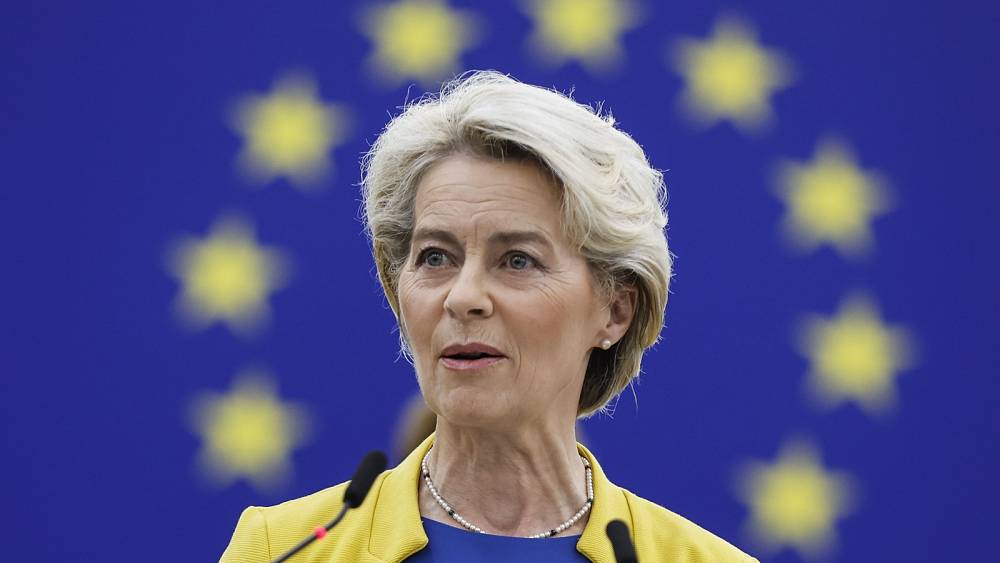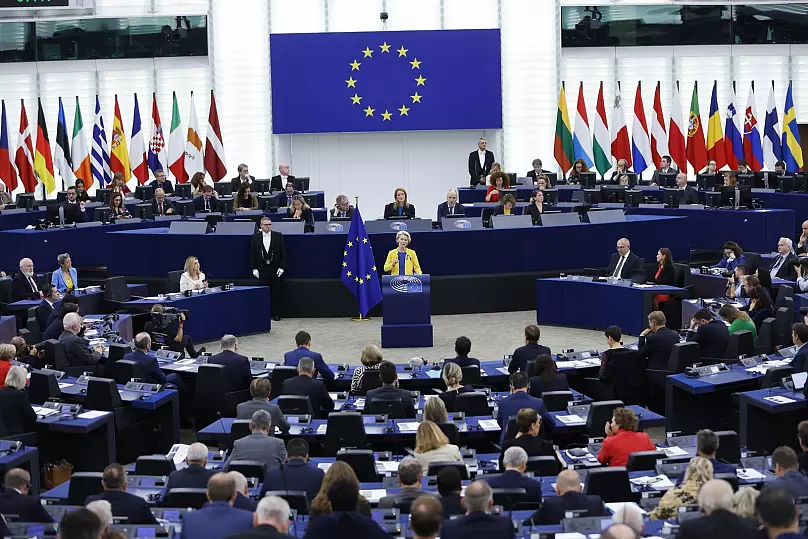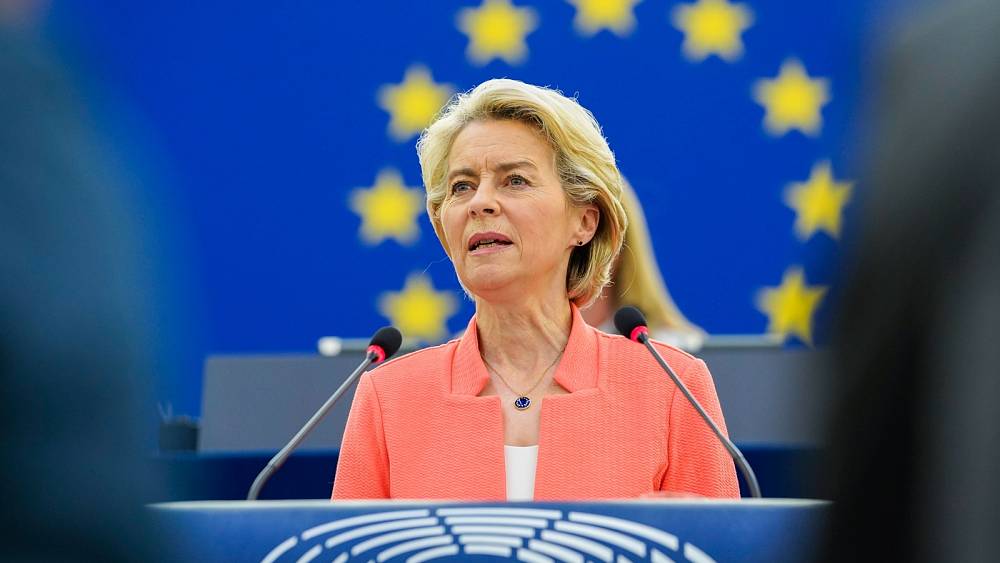Ursula von der Leyen delivered on Wednesday her annual State of the Union speech, unveiling the main political priorities for the next working year.
Russia’s war in Ukraine and the worsening energy crisis were recurring themes in the address, giving the special occasion a markedly sombre undertone.
“As we look around at the state of the world today, it can often feel like there is a fading away of what once seemed so permanent,” she said.
However, von der Leyen also injected doses of optimism and made a passionate case for a stronger and closer union emerging from the overlapping crises.
“We will succeed – and that success will belong to every one of us,” she noted, quoting the late Queen Elizabeth II.
Here are the six takeaways from this year’s State of the European Union address.
1. ‘Sanctions are here to stay’
Von der Leyen began her speech by praising Ukraine’s resistance against Russia’s invasion, describing the country as a “nation of heroes” and vowing the EU’s solidarity will “remain unshakable.”
Ukraine’s first lady, Olena Zelenska, was her guest of honour and received a standing ovation from MEPs.
“Today, courage has a name, and that name is Ukraine,” von der Leyen said, adding she will travel to Kyiv later in the day.
The Commission chief also unveiled several proposals to align Ukraine with the single market, including by extending the European free-of-charge roaming area, and support its reconstruction, with €100 million to rebuild damaged schools.
However, she did not present any plans for new weapons delivery, as Kyiv continues to demand in the midst of a lighting counteroffensive.
She added that the EU should have listened to eastern European countries that “have been telling us for years that Putin would not stop.”
Von der Leyen then spoke about Russia, the state of its economy and the high price that Vladimir Putin is paying for his “trail of death and destruction.”
“The Russian military is taking chips from dishwashers and refrigerators to fix their military hardware, because there are no semiconductors anymore,” she said. “Russia’s industry is in tatters.”
“It is the Kremlin that has put Russia’s economy on the path of oblivion,” she added.
In what appeared to be a direct rebuke to critics who claim the EU’s hard-line against Russia will eventually collapse under the weight of the energy crisis, von der Leyen sought to dispel any doubts.
“I want to make it very clear: the sanctions are here to stay,” she said. “This is time for us for resolve and not appeasement.”
2. ‘We have to decouple’
As expected, the energy crisis featured high on von der Leyen’s to-do list.
“Russia keeps actively manipulating our energy market. I mean, they prefer to flare the gas instead of sending it to Europe according to the contracts,” she said.
The Commission chief officially presented three key proposals to curb electricity bills: an EU-wide plan to introduce mandatory electricity savings, a uniform price cap on the excess revenues made by inframarginal power plants (that is, those who don’t use gas, such as renewables, nuclear, hydropower and lignite), and a windfall tax to partially capture the huge profits reaped by fossil fuel companies.
The first measure intends to lower consumption during peak hours (usually 7 am to 10 pm) in order to bring down prices, while the other two are aimed at raising “more than €140 billion” in extra funds for governments to pass onto consumers under financial stress.
“In these times, it is wrong to receive extraordinary record revenues and profits, benefitting from war and on the back of our consumers,” von der Leyen said. “Profits must be shared and channelled to those who need it the most.”
Conspicuous by its absence was a more radical and risky idea to introduce a price cap on all gas imports, as demanded last week by a majority of member states. The Commission has warned the cap could push shippers to sell their gas somewhere else and endanger the EU’s security of supply ahead of the winter.
Von der Leyen, however, did endorse calls for a decoupling of prices in the electricity markets.
Under the current system, known as merit order, the final price of electricity is set by the most expensive fuel needed to meet all power demands: in this case, gas. As gas prices soar, so do electricity bills.
“The current electricity market design – that is based on the principle of merit order – is not fit for purpose anymore, it is not just for consumers anymore,” she said.
“We have to decouple the dominant influence of gas on the price of electricity. This is why we will do a deep and comprehensive reform of the electricity market.”
But the reform is expected to take time to develop and will only brings answers in the long term.
3. ‘We must make nature our first ally’
Von der Leyen’s diagnosis of the energy crisis has one root cause: the EU’s heavy dependency on fossil fuels.
The bloc, she said, should now strive to speed up the transition away from all imported fuels and develop homegrown and self-reliant systems of green technology, like Denmark did when it bet hard on wind power in the aftermath of the 1970s oil crisis.
“The good news is: this necessary transformation has already started,” she said.
The president talked of hydrogen as a “game changer” for the continent and said her executive will propose to create a new European Hydrogen Bank to secure around €3 billion in investments for the sector.
“We’ve all seen to what extent the Green Deal is important. Summer 2022 will remain in people’s memoires,” she said. “We all saw the dry rivers, the burning forests, the impact of the extreme heat. And under the surface, the situation is far starker.”
Von der Leyen commended the cross-border solidarity seen in recent natural disasters, with member states sending planes to fight devastating fires in France and Germany.
She then vowed to double the EU’s firefighting reserves in the next year and purchase “10 light aircrafts and three helicopters” for the common fleet.
At international level, the president said she will push for a stronger defence of biodiversity at the upcoming UN conference in Montreal, as well as in the COP27 in Egypt.
“We must work relentlessly to adapt to our climate – making nature our first ally,” she said.
4. ‘A new reality of higher public debt’
Closely linked to the green transition, von der Leyen spoke about the EU’s fiscal rules, a highly sensitive topic that has for years sparked tensions between Northern and Southern countries.
The disciplinary rules, known as the Stability and Growth Pact (SGP), require members states to implement financial policies that keep their deficit under 3% and debt under 60% of GDP, limits that many governments currently exceed by a considerable margin.
The SGP remains suspended to cope with the current crises and pending a reform.
“The future of our children needs both that we invest in sustainability but also that we invest sustainably,” von der Leyen said, noting high debt was a “new reality.”
“We need fiscal rules that allow for strategic investment, while safeguarding fiscal sustainability,” she added. “Rules that are fit for the challenges of this decade.”
The current debate centres on how fast countries should be required to reduce their levels of public debt and how many exceptions should be made in the total calculation. For example: some countries would like to see investments in green technology spared from the SGP surveillance.
While von der Leyen did not explicitly endorse the proposal, she said the reformed rules should offer more flexibility and ownership to invest in national projects but also greater accountability and scrutiny.
“There should be simpler rules that all can follow,” she said. “Stability and growth can only go hand in hand.”
The Commission will present its first proposal to reform the rules in October.
5. ‘We must also eradicate corruption at home’
One of the most compelling segments of von der Leyen’s speech came in its second half, when the president spoke about the threats faced by democracies in the 21st century.
First, she warned about the “foreign autocrats” funding entities inside the EU to spread “disinformation” and “toxic lies,” such as a Chinese centre in Amsterdam that dismissed the mass internment of Uyghurs as “rumours.”
Von der Leyen promised to combat these threats with a Defence of Democracy package, which, she said, would expose covert foreign influence and shed light on “shady funding.”
“We will not allow any autocracy’s Trojan horses to attack our democracies from within,” she told MEPs.
The president vowed to add crimes of corruption in the EU’s human rights sanctions regime, a relatively new tool that has been used to blacklist individuals in Russia, China, Libya and Eritrea.
Von der Leyen then looked inwards and reflected on the “vices that corrode” the EU from within. The bloc has struggled to address democratic backsliding in several member states, most notably Poland and Hungary.
“If we want to be credible when we ask candidate countries to strengthen their democracies, we must also eradicate corruption at home,” she said.
Although the president did not single out any member state in particular, she said payments under the common EU budget will continue to be linked to the respect for judicial independence and the rule of law.
The executive has already started the formal procedure to partially freeze Hungary’s assigned shared of funds, while Poland’s COVID-19 recovery plan depends on domestic reforms.
6. ‘A rethink of our foreign policy agenda’
In her speech, von der Leyen sounded the alarm about the precarious state of the rules-based international system of peace and security, which she described as being “the very target of Russian missiles.”
“This watershed moment in global politics calls for a rethink of our foreign policy agenda,” she said. “This is the time to invest in the power of our democracies.”
The Commission chief urged the EU to work more closely with “like-minded partners” and promote democracy around the world.
This effort, she said, should begin in the bloc’s immediate neighbourhood.
“I want the people of the Western Balkans, of Ukraine, Moldova and Georgia to know: you are part of our family, you are the future of our union, and our union is not complete without you,” she declared.
Von der Leyen threw her support behind the idea to establish a European Political Community, an initiative advocated for by French President Emmanuel Macron.
The community’s first meeting will take place next month and gather the 27 EU countries with over 17 counterparts from Europe, including the UK, Turkey, Norway, Switzerland, Ukraine and the Western Balkans.
Beyond the Western club, von der Leyen said the EU should engage with different regions, like Africa and Latin America, and boost its investments in infrastructure, green tech and digital networks.
“This requires investment on a global scale,” she said, adding that, together with US President Joe Biden, she will convene a leaders’ meeting to review common projects.
On a separate note, von der Leyen said her executive would inject new momentum to the long-stalled ratification of EU trade deals with Chile, Mexico and New Zealand.
Towards the end of the speech, the Commission president said that a larger EU would inevitably require profound internal reform, a process that would entail changing the EU treaties and overcome the strong reticence from some capitals.
“As we are serious about a larger union, we also have to be serious about reform,” von der Leyen told MEPs.
“So, as this Parliament has called for, I believe the moment has arrived for a European Convention.”








